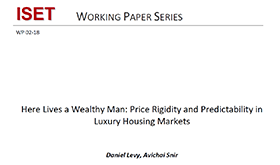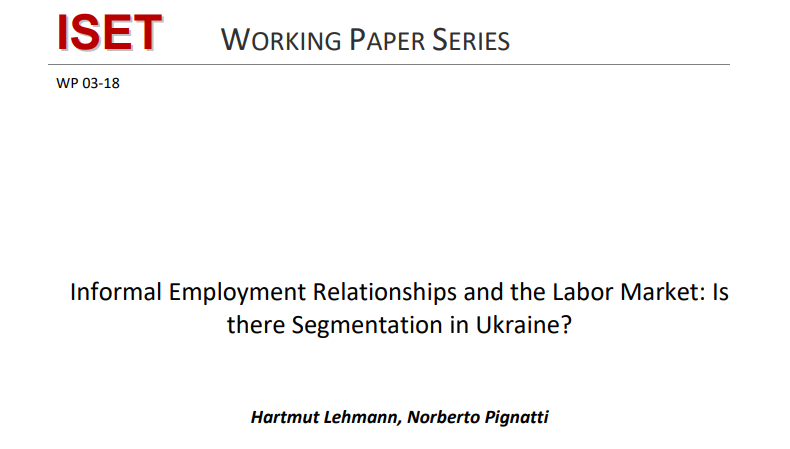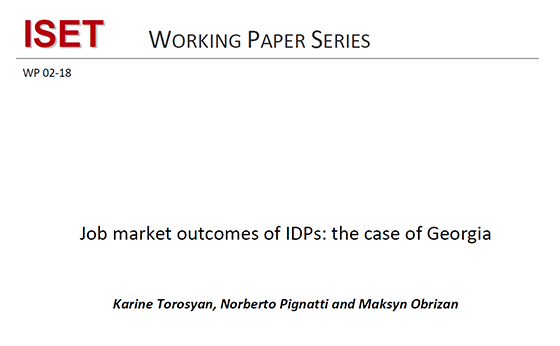Faculty Research
Informal Employment Relationships and the Labor Market: Is there Segmentation in Ukraine?
by Hartmut Lehmann, Norberto Pignatti
One of the most important factors that determine individuals’ quality of life and wellbeing is theirOne of the most important factors that determine individuals’ quality of life and wellbeing is theirposition in the labor market and the type of jobs that they hold. When workers are rationed out of theformal segment of the labor market against their will, i.e., the labor market is segmented, their qualityof life is limited, and their wellbeing is reduced. When they can freely choose between a formal orinformal employment relationship, i.e., the labor market is integrated, their wellbeing can reach highlevels even in the presence of informal employment. We, therefore, test whether the Ukrainian labormarket is segmented along the formal-informal divide, slicing the data by gender and age. Read more...
Job market outcomes of IDPs: the case of Georgia
by Karine Torosyan, Norberto Pignatti and Maksyn Obrizan
Internally displaced people (IDPs) constitute a serious economic, social and cultural problem for many countries, including countries in transition. Despite the importance of the problem, there are only a handful of previous studies investigating the issue of labor market outcomes of IDPs. We aim to fill this gap in the literature using 13 years of Integrated Household Surveys over 2004-2016 from Georgia, which experienced large flows of internal migrants from the early 1990s until now. Our analyses indicate that the labor market outcomes of IDPs are much worse than those of local residents. Specifically, IDPs are 3.9 to 11.2 percentage points less likely to be in the labor force, depending on the period and duration of IDP status. IDPs are also up to 11.6 percentage points more likely to be unemployed, sometimes even after 20 years of forced displacement. Finally, IDPs residing in a locality for more than 5 years receive persistently lower wages than local residents with similar characteristics, with the gap widening over time, reaching some 16 percentage points in the last period under analysis. Read more...
Here Lives a Wealthy Man: Price Rigidity and Predictability in Luxury Housing Markets

by Daniel Levy, Avichai Snir
We use novel and unique data to study the effect of price changes in the market for luxury and middle class homes. We find that luxury home sales respond less to price changes than the middle-class home sales; in the market for luxury homes, past prices affect current prices; luxury home prices persist; and prices of luxury homes are stickier than prices of middle-class homes. Recent macroeconomic models predict that housing markets can have counter-cyclical effect, if home prices are flexible. Our findings imply that home prices, especially luxury home prices, may not be flexible enough to generate such effect. Read more...
The International Spillover Effects of Political Transitions

by Yaroslava Babych
Why do political transitions to more representative forms of government are often associated with vastly different outcomes for different countries? This paper examines the possibility of cross-country “political spillovers”, testing in particular whether countries surrounded by relatively more autocratic neighbors also experience a more difficult economic adjustment process following democratization. The dynamic fixed effects model, estimated using the pooled mean group estimator methodology of Pesaran, Shin and Smith (1999) allows to account for both short and long-run effects of political spillovers between neighboring countries. In particular, the paper finds evidence that for countries which have experienced democratization, moving away from their neighborhoods on the political spectrum implies slower GDP per capita growth in the long run. Read more...
Do Political Regime Changes Help Predict Growth Takeoffs?

by Yaroslava Babych
Do political regime changes as well as the quality of political institutions help predict the turning points in a country’s growth history? I show that controlling for a variety of economic factors, both democratic and autocratic regime changes help predict growth “takeoffs”. However, I find evidence that countries with low levels of income per capita benefit less from democratizations. This threshold level of income is estimated using Hansen’s threshold regression methodology. The threshold regression approach also reveals non-linearities in the effect of trade openness and level of political development on growth. In particular, I find that countries in the mid-range of trade openness benefit the most from an increase in trade volumes. Read more...
Measuring Food Price Volatility in Georgia

by Salome Gelashvili, Patima Mamardashvili
Food price volatility is an important determinant of access to food. Given Georgia’s low self-sufficiency ratio (34%) and its dependence on international markets, Georgia has few mechanisms to control food price volatility, particularly when it is driven by international market conditions. The goal of this paper is to measure the price volatility of wheat, potato and maize flour in Georgia, and define major drivers of volatility through a time series analysis of retail prices of those three food products, which account for a significant share of households’ spending on food. Results of the analysis are expected to contribute to Georgia’s policy on food security, as well as agricultural policy in general. Read more...
An Impact Evaluation of Mass Replacement of School Principals in Georgia

by Zurab Abramishvili
This paper investigates how a unique education policy positively affected university enrollment rates of public school students in Georgia. In 2007, the Georgian government enacted legislation mandating the replacement of all public school principals under the assumption that the replacement of the principals with randomly assigning qualified candidates to public schools would fairly decentralize and improve school governance across Georgia. About half of public school principals were actually replaced with new candidates and a majority of them were assigned through a random allocation mechanism. Read more...
Military Service and Future Earnings Revisited

by Muhammad Asali
Utilizing particularities in the Israeli laws and regulations, that exempt married women and ultra-orthodox Jewish men from military service, we provide evidence about the effects of compulsory military service on future earnings of veterans. The quasi-experimental estimates suggest that women experience a 4.6 percent military wage premium, while men experience a premium of 11.6 percent. These effects are far smaller than those experienced by minority groups, confirming the common notion in this literature. Finally, the discrepancies we found between the naïve and the consistent estimates suggest that people who voluntarily avoid service are those who face the highest opportunity costs of service. Read more...
Employment Discrimination in Georgia: Evidence from a Field Experiment

by Muhammad Asali, Norberto Pignatti and Sophiko Skhirtladze
We provide experimental evidence about ethnic discrimination in the labor market in Georgia. We randomly assign Georgian and non-Georgian, male and female, names to similar resumes and apply for jobs as advertised in help-wanted web sites in Georgia. We find that gender has no effect on the probability of callback, but a job applicant who is ethnic Georgian is twice more likely to be called for a job interview than an equally skilled ethnic non-Georgian (Azeri or Armenian). The almost 100% gap in callbacks is statistically significant and cannot be abridged by having more experience or education. Both taste-based discrimination and statistical discrimination models are consistent with the evidence provided in this study. Labor market discrimination tends to aggravate in economic busts. Read more...
Toothless reforms? The remarkable stability of female labor force participation in a top-reforming country

by Norberto Pignatti, Karine Torosyan, Maka Chitanava
Low Female Labor Force Participation (FLFP) constitutes a foregone opportunity at both the macro and at the micro levels, potentially increasing the vulnerability of households and lowering the long-run development perspectives of a country. Most international organizations and national policy makers see low FLFP as a serious issue that needs to be addressed by adopting appropriate policies. We investigate the possible reasons of the remarkable stability of FLFP in a top-reforming upper-middle income country. Our goal is to disentangle the different forces at work and to draw useful lessons for the design of participation-enhancing policies. Using data from a nationally representative Household Survey covering the period 2003-2015, we employ Blinder-Oaxaca (Blinder, 1973 and Oaxaca, 1973) type... Read more...
More...
Potterian Economics
End of 9-Endings and Price Perceptions
Economic Growth in the Potterian Economy
Explicit Evidence of an Implicit Contract
CONTACT US
16, Zandukeli St,
0108 Tbilisi,
Georgia
Telephone: (+995 32) 250 71 77
Email: info@iset.ge



